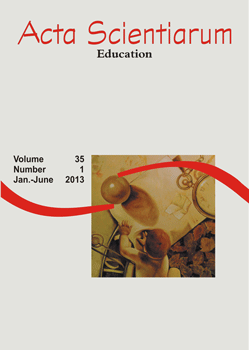<b>A Educação em São Boaventura</b> - doi: 10.4025/actascieduc.v35i1.19229
Resumen
Cada época teve seu próprio modelo, ou melhor, seus próprios modelos de educação. Embora possamos dizer que a civilização ocidental, de um modo ou de outro, é toda ela devedora a uma visão cristã do mundo, contudo, é preciso levar em consideração o modo como essa influência atuou na sociedade. Ora, os medievais quase não escreveram tratados específicos sobre o tema; não houve entre eles nenhum Piaget. Sendo eles teólogos e vivendo num mundo envolto pela placenta cultural da fé, preocuparam-se com o que deveria ser ensinado e como deveria ser ensinado. Já Santo Agostinho (2005), no De catechizandis rudibus (De como catequizar os simples) tratava tanto dos problemas de linguagem e de comunicação, como do conteúdo a ser ensinado. No presente texto, atenho-me aos ensinamentos de São Boaventura. Na qualidade de Ministro Geral da Ordem franciscana, redigiu diversos tratados sobre o tema. Atenho-me, sobretudo, à Regula novitiorum (Regra de vida dos noviços), à De perfectione vitae ad sorores (Sobre a perfeição da vida), complementando eventualmente com a Epistola continens viginti quinque momorialia (Carta contendo vinte e cinco temas a serem lembrados).
Descargas

This work is licensed under a Creative Commons Attribution 4.0 International License.
DECLARACIÓN DE ORIGINALIDAD Y DERECHOS DE AUTOR
Declaro que este artículo es original y no ha sido presentado para publicación en ninguna otra revista nacional o internacional, ni en parte ni en su totalidad.
Los derechos de autor pertenecen exclusivamente a los autores. Los derechos de licencia utilizados por el periódico son la licencia Creative Commons Attribution 4.0 (CC BY 4.0): por lo tanto, se permite compartir (copiar y distribuir el material en cualquier medio o formato) y adaptar (remezclar, transformar y crear material a partir del contenido). licencia para cualquier propósito, incluidos fines comerciales).
Se recomienda leer este enlace para obtener más información sobre el tema: proporcionar créditos y referencias correctamente, entre otros detalles cruciales para el buen uso del material licenciado.













































